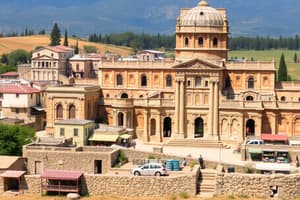Podcast
Questions and Answers
Which of the following best describes the role of historiography in the study of history?
Which of the following best describes the role of historiography in the study of history?
- The exclusive use of primary sources to construct historical accounts.
- The creation of fictional narratives based on historical events.
- The critical examination of methods, sources, and biases used by historians. (correct)
- The memorization of key historical dates and names.
When analyzing primary sources, what considerations are most important for a historian?
When analyzing primary sources, what considerations are most important for a historian?
- The aesthetic appeal and artistic merit of the source.
- The authenticity, potential bias, and intended audience of the source. (correct)
- The perceived popularity of the source during its time.
- The source's length and readability for modern audiences.
In historical analysis, how do historians typically approach the concept of causation?
In historical analysis, how do historians typically approach the concept of causation?
- By disregarding underlying factors in favor of immediate triggers.
- By analyzing multiple contributing factors and distinguishing between immediate and underlying causes. (correct)
- By attributing events to single, easily identifiable causes.
- By focusing solely on economic factors, ignoring social and political influences.
What distinguishes primary sources from secondary sources in historical research?
What distinguishes primary sources from secondary sources in historical research?
Why is understanding 'context' crucial when examining historical events?
Why is understanding 'context' crucial when examining historical events?
Which period relies most heavily on archaeology and anthropology for understanding, due to the absence of written records?
Which period relies most heavily on archaeology and anthropology for understanding, due to the absence of written records?
How do historians incorporate the concept of 'perspectives' into their analysis of the past?
How do historians incorporate the concept of 'perspectives' into their analysis of the past?
What is the significance of studying both 'change' and 'continuity' in historical analysis?
What is the significance of studying both 'change' and 'continuity' in historical analysis?
Which approach to studying history would be most concerned with analyzing the impact of trade routes on the spread of diseases?
Which approach to studying history would be most concerned with analyzing the impact of trade routes on the spread of diseases?
A historian is researching the daily lives of peasants in Medieval Europe. Which research method would likely provide the most direct insights?
A historian is researching the daily lives of peasants in Medieval Europe. Which research method would likely provide the most direct insights?
Which of the following best exemplifies presentism in historical analysis?
Which of the following best exemplifies presentism in historical analysis?
How did the Enlightenment influence the French Revolution?
How did the Enlightenment influence the French Revolution?
Which scenario exemplifies how studying history informs decision-making in contemporary society?
Which scenario exemplifies how studying history informs decision-making in contemporary society?
What was a primary consequence of the Age of Exploration?
What was a primary consequence of the Age of Exploration?
How did the Industrial Revolution most significantly transform societies?
How did the Industrial Revolution most significantly transform societies?
A historian discovers two conflicting primary source accounts of the same event. What is the most appropriate course of action?
A historian discovers two conflicting primary source accounts of the same event. What is the most appropriate course of action?
Which of the following is a key difference between social history and political history?
Which of the following is a key difference between social history and political history?
Which period is characterized by a renewed interest in classical art, literature, and philosophy, following the Middle Ages?
Which period is characterized by a renewed interest in classical art, literature, and philosophy, following the Middle Ages?
Flashcards
History
History
The study of the past, particularly the human past, through narrative and analysis.
Historiography
Historiography
The study of how historians interpret and analyze the past, including their methods and biases.
Primary Sources
Primary Sources
Original materials from the time period being studied (e.g., letters, artifacts).
Secondary Sources
Secondary Sources
Signup and view all the flashcards
Causation
Causation
Signup and view all the flashcards
Change and Continuity
Change and Continuity
Signup and view all the flashcards
Context
Context
Signup and view all the flashcards
Prehistory
Prehistory
Signup and view all the flashcards
Middle Ages
Middle Ages
Signup and view all the flashcards
Renaissance
Renaissance
Signup and view all the flashcards
Political History
Political History
Signup and view all the flashcards
Social History
Social History
Signup and view all the flashcards
Archival Research
Archival Research
Signup and view all the flashcards
Oral History
Oral History
Signup and view all the flashcards
Bias in Historical Interpretation
Bias in Historical Interpretation
Signup and view all the flashcards
Presentism
Presentism
Signup and view all the flashcards
Significance of Studying History
Significance of Studying History
Signup and view all the flashcards
Agricultural Revolution
Agricultural Revolution
Signup and view all the flashcards
Study Notes
The provided text contains no new information. The existing notes do not need to be updated.
Studying That Suits You
Use AI to generate personalized quizzes and flashcards to suit your learning preferences.



